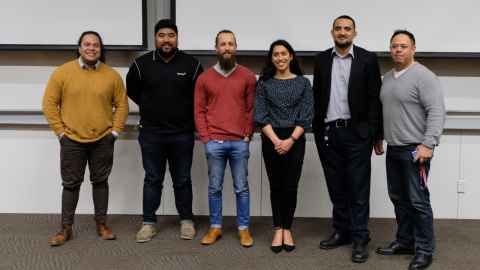Māori and Pacific graduates share their stories with current Engineering students
30 August 2018
On Monday 13 August, the Faculty of Engineering hosted a careers and networking event for Tuākana and SPIES students.

On Monday 13 August, the Faculty of Engineering hosted a careers and networking event for Tuākana and SPIES students. The evening was an opportunity for current students to get an idea of what they could be doing within the first few years of graduation, as well as what they can start doing now to prepare.
Dr Tumanako Fa’aui – our most recently appointed lecturer – was enlisted to MC the event. He spoke of how last year’s themes of helping students learn who they are and find their place leads into this year’s event. Dr Fa’aui was also the recipient of the recognition award that’s given out at this event each year, much to his surprise. It was presented by Steve Roberts, who noted that Tūmanako fills the void left by Dr Kepa Morgan and gifted him a leather satchel. The gift reflects his achievement in becoming a lecturer while acknowledging his future potential here as well.
The four speakers were all recent graduates who came through the SPIES and Tuakana programmes and have begun finding their way in their respective careers.
Havea Pamaka, a Civil Engineer at Downer, spoke first. One of the most influential moments on his path to become an engineer came in 2006 when he was visiting his cousin in Tonga. There had been significant riots there and the damage he saw had a real impact. Havea wondered what he could do to make a difference in situations like this, even questioning if he should pursue a qualification in Law or Politics before he realised Civil Engineering would also give him the tools to help him to contribute to his community.
After finishing his degree, Havea was accepted into the graduate program at Downer. It was a role that took him to the Chatham Islands for a challenging job helping to upgrade the island’s wharf. The $54 million dollar project ensures the boat that supplies the island with food and other essentials has a safe place to dock. While Havea said there were some challenging times due to the nature of the rostered work, there was also opportunity for community engagement through food festivals and playing rugby against the locals.
The second speaker was Cara Berghan, a Graduate Electrical Engineer at WSP OPUS. The theme of her presentation was that we’re all molded by our background, and she could trace the ways her different education environments influenced her growing up. Growing up in Northland, she started in a Kohanga Reo which consisted with hands-on engagement in an interactive environment, where she was surrounded by her nanas and other family members.
Her education journey then took her from a more traditional learning environment in a kindergarten, to a small catholic school and finally to Epsom Girls Grammar where Cara boarded. Over this time she’d realised her deep love for maths and reading, but even as late as high school was unsure whether she should pursue Medicine or Engineering. Between asking her friends on Facebook and sitting in on a visit from Steve Roberts and Dennis Matane in seventh form, where she found out more about what the subject entailed, she settled on Engineering.
People should be comfortable being themselves and be proud to take their culture with them.
Nathan Roa, now a Product development engineer at Fisher and Paykel Healthcare, also talked about how he hadn’t decided on Engineering until later. Like Cara, he also considered a career in Medicine, but it was the problem-solving elements of Engineering that drew him in. Nathan’s parents own a company and would regularly talk business over dinner, and he felt like a well-rounded degree such as Engineering would be the best way to set himself up to follow in their footsteps.
One of the main lessons Nathan learnt in his first few years of work was that nothing makes you more of a perfectionist than when you have people relying on you, and being in a situation like this is a good opportunity to set an example. He also encouraged students there to work on more than just their grades when they’re getting ready to join the workforce. While grades are important, it helps if they’re supported by practical experience, as Nathan found employers liked that he had workshop experience.
Finally, Sifa Pole, an Operations Controller in the Wastewater Department at Watercare, talked about how his upbringing made him realise how hard he would need to work to get what he wanted. Sifa was the youngest of seven children and often had to share a room with his siblings. He was one of only two students from Wesley College in Engineering, but he still managed to find friends and make connections through networks like SPIES.
Sifa originally worked at CLC Consulting Group as a Consultant in Structural Engineering before moving on to build trenches at Brian Perry Civil. He then wanted to do something else and ended up working at Watercare where he says there’s a lot of good people. He’s in a client-facing role and has worked in construction and contracts so he’s already had the chance to engage with a number of difference facets of Engineering.
Alongside events like this, the Faculty of Engineering’s Tuākana Programme also offers mentoring services and targeted tutorials for its Māori and Pacific students. On the social and cultural side, the SPIES network has been bringing Māori and Pacific Engineering students together since 1993 and provides members with a dedicated space for study and recreation.